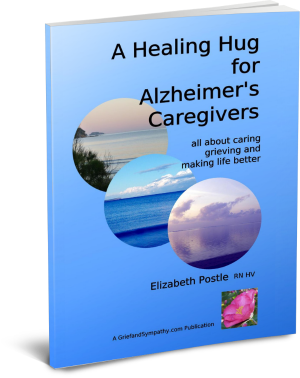What Is Anticipatory Grief?
by Elizabeth Postle, RN, HV, FWT
Here is a simple anticipatory grief definition:
- When someone we love, or we ourselves have a terminal illness, we will experience anticipatory grief. We will suffer grief both before and after the death.
- Some people have to grieve for their own life, when told they have a terminal illness and that they have only months or short years to live.
Anticipatory Grief Symptoms
We all live with a certain amount of anticipatory grief from an early age. Scary children’s stories and tales which include death start to let children know that one day we are all going to die. At first children take it in their stride and know that Humpty Dumpty couldn’t be put back together again, but don’t imagine it will happen to them or their family.

The initial reaction on hearing that a loved one is terminally ill is the same as for any bereavement. Shock, denial, pain, anger, tears. You can read more about the emotions of grief here.
But as time goes on, if you are caring for a loved one for months or years, you may not realise that you are grieving. Sadness, depression, irritability or anxiety, insomnia or exhaustion can all be signs or symptoms that you are grieving. We don't believe that there is a set pattern of anticipatory grief stages, as everyone is different, but you may experience any of the above feelings in any order. Grief comes in waves when you least expect it, or it can feel like being on a roller coaster of emotions.
Just being aware that you are going through a grieving process can help. Give yourself time to look after your own needs as well as those of your loved one. Read pages on this site about how to cope with grief and looking after your own health.
How to Cope with Anticipatory Grief
Many people use the time they have left to achieve ambitions left on hold, go on holiday, visit families abroad. Tick off a few things from the bucket list, things they’d never got round to doing. Often people realise that they haven’t time to waste and motivation sets in.
Planning happens. Then action. They want to leave good memories for family and friends.
Some may leave work and get all their affairs in order.
How many of us are given the opportunity to do this?
It is important to realise how precious life is and to try not to waste any of it moping. You often hear people say “they were courageous to the end”. Those are the people who make a conscious decision to make the most of every minute they have left.
Instead many family members may die of a stroke or heart attack or accident with no opportunity to sort out their affairs and say their goodbyes. I wonder what we’d choose if given the chance?
Although it is certainly far from easy, perhaps we can look on this period of life as an opportunity to organise affairs, put things right with our loved ones and say those things we often put off saying.
Being able to say goodbye can be very comforting and special. It will be a painful time, but it can also be a loving and compassionate time.
Anticipatory Grief Doesn't Mean you Won't Also Grieve After the Death
Of course, just because you have coped with anticipatory grief, doesn't mean you won't also go through some of the emotions of grief after the death of your loved one. You will probably still suffer from shock and numbness. Perhaps you will be angry or jealous of those who still have their loved ones around. Read more about the emotions of grief here.
If you are grieving there are lots of pages on this site that can help you and hopefully give you some comfort. I have been helping people with grief for my whole 50 year nursing career and so I hope that my experience will help others in their time of need.
Anticipatory Grief for those with Dementia
One of the saddest types of anticipatory grief is experienced by those who have a loved one with dementia or Alzheimer's in the family. Not only do they have to cope with the physical aspects of disease, but a terminal illness which takes away the personality of the sufferer.
Often a carer will be living with a person who has completely changed, and they are grieving for the person they love while they are still there. You can read about this in my page 'Alzheimer's Spouse Grief'
Caregivers often work so hard to look after themselves and their loved one that they are unaware that they are also grieving. They can be shocked when their loved one dies that their grief is so strong as they imagine that they had been anticipating it so it wouldn't be as much of a shock when it actually happens. Read more about Caregiver Grief here.
If you are coping with Alzheimer's disease you might find our book helpful. Written by the author of this website, Elizabeth Postle, it has a lot of practical information about caring, as well as emotional support to help with the grief and stress of caring. Click on the book to learn more.
Related Pages:
Elizabeth Postle had a varied and fulfilling nursing career, culminating in running her own high dependency hospice. She is the author of this website. Read more about her here.
- Grief and Sympathy Home
- Other Types of Grief
- What Is Anticipatory Grief
Where to get help:
Have You Considered One-on-One Online Grief Counseling?
Get Expert and Effective Help in the Comfort of Your Own Home
The following information about online counseling is sponsored by 'Betterhelp' but all the opinions are our own. To be upfront, we do receive a commission when you sign up with 'Betterhelp', but we have total faith in their expertise and would never recommend something we didn't completely approve.
Do you feel alone and sad with no support and no idea how to move forward? It can be tough when you are stuck in grief to find the motivation to get the most out of your precious life.
Online counseling can help by giving you that support so you don't feel so alone. You can have someone to talk to anytime you like, a kind and understanding person who will help you to find meaning in life again, to treasure the memories of your loved one without being overwhelmed and to enjoy your activities, family and friends again.
- Simply fill out the online questionnaire and you will be assigned the expert grief counselor most suitable for you. It only takes a few minutes and you don't even have to use your name.
- Pay an affordable FLAT FEE FOR UNLIMITED SESSIONS.
- Contact your counselor whenever you like by chat, messaging, video or phone.
- You can change counselor at any time if you wish.
- Click here to find out more and get started immediately.
- Or read more about how online counseling works here.
Sales from our pages result in a small commission to us which helps us to continue our work supporting the grieving.
Hypnosis for Grief - 10 Ways It Can Help You
Try a gentle hypnotherapy track to relax the mind. Learn how self-hypnosis can help you cope with grief at any time of the day or night.

For Remembrance:
Sales from our pages result in a small commission to us which helps us to continue our work supporting the grieving.
Memorial Jewelry to Honour a Loved One
Check out our lovely range of memorial jewelry for any lost loved one. Pendants, necklaces, rings or bracelets, we have them all in all kinds of styles. Choose for yourself or buy as a sympathy gift.
Create an Online Memorial Website
Honour your loved one with their own memorial website. Share photos, videos, memories and more with your family and friends in a permanent online website. Free for basic plan with no ads.












